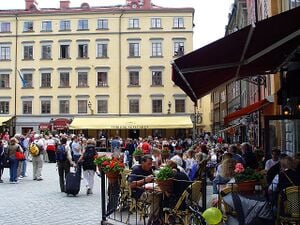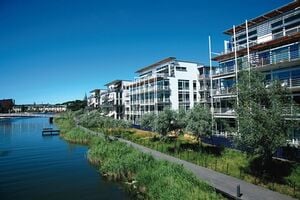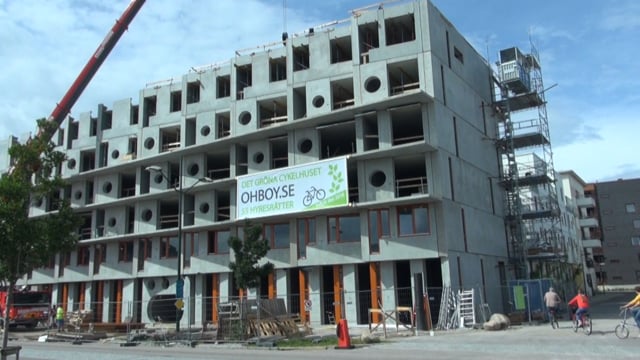
The aim of this page is to recognise, celebrate and encourage the self-empowerment of community agency networks (CANs) and community groups' activism for climate, environment and many other sustainability topics across Sweden.
 World's tallest wooden wind turbine starts turning, BBC News (Dec 28, 2023)
World's tallest wooden wind turbine starts turning, BBC News (Dec 28, 2023)  Stockholm to ban petrol and diesel cars from centre from 2025, theguardian.com (Oct 11, 2023)
Stockholm to ban petrol and diesel cars from centre from 2025, theguardian.com (Oct 11, 2023)  The Beyond Oil and Gas Alliance now has 10 core members (Costa Rica, Denmark, France, Greenland, Ireland, Portugal, Quebec, Sweden, Wales, and Washington State), two associate members (California and New Zealand), and five "friends of BOGA" (Chile, Fiji, Finland, Italy, and Luxembourg)., beyondoilandgasalliance.org (Nov 16, 2022) — BOGA is an international alliance of governments and stakeholders working together to facilitate the managed phase-out of oil and gas production, led by the governments of Denmark and Costa Rica
The Beyond Oil and Gas Alliance now has 10 core members (Costa Rica, Denmark, France, Greenland, Ireland, Portugal, Quebec, Sweden, Wales, and Washington State), two associate members (California and New Zealand), and five "friends of BOGA" (Chile, Fiji, Finland, Italy, and Luxembourg)., beyondoilandgasalliance.org (Nov 16, 2022) — BOGA is an international alliance of governments and stakeholders working together to facilitate the managed phase-out of oil and gas production, led by the governments of Denmark and Costa Rica
Climate action[edit | edit source]
Climate change has received significant scientific, public and political attention in Sweden. In 1896, Swedish chemist Svante Arrhenius was the first scientist to quantify global heating. Sweden has a high energy consumtion per capita, but reducing the dependency on fossil energy has been on the agenda of cabinets of the Governments of Sweden since the 1970s oil crises. In 2014 and 2016, Sweden was ranked #1 in the Global Green Economy Index (GGEI), because the Swedish economy produces relatively low emissions. Sweden has had one of the highest usages of biofuel in Europe and aims at prohibiting new sales of fossil-cars, including hybrid cars, by 2035, and for an energy supply system with zero net atmospheric greenhouse gas emissions by 2045.
Since the end of the 19th century, the average annual temperature has risen by almost two degrees Celsius, which can be compared to global warming of just over one degree. Sweden's winter temperature is predicted to further increase by as much as 7°C (13°F) by 2100 in a worst case scenario. This will increase the percentage of precipitation that comes from rain instead of snow. The Baltic Sea could see a surface water temperature increase of up to 4°C (7°F). This will decrease sea ice cover by the end of the century.
The Swedish Civil Contingencies Agency (MSB) produces guidelines and resources to help citizens adapt to climate change. The MSB keeps flood and landslide maps online, and guidelines for decision-making in case of disasters.
Governmental efforts include policy instruments and legislation to mitigate and adapt to climate change. Policy instruments include taxing carbon dioxide emissions, issuing renewable energy certificates, subsidizing renewable energy initiatives, and making investments in R&D.
Public participation is quite important in addressing climate change and its effects and developing adequate responses. Without the support of the public, it is impossible to implement a new policy instrument successfully. For example, one cannot anticipate that bio ethanol and bio diesel could be widely consumed without support and understanding from the general population. Therefore, information to raise the public's level of knowledge concerning the climate issue is necessary.
One public initiative, hosted by the KTH Royal Institute of Technology, is the Viable Cities program, which works with nine Swedish cities, including Stockholm, Gothenburg, and Malmö, to support becoming carbon neutral and sustainable by 2030. The initiative, called Climate Neutral Cities 2030, will include 20 Swedish cities by the end of 2021. A new instrument in Viable Cities work is Climate City Contract 2030. It was signed by the top political leadership of the nine municipalities, by the Directors-General of the government agencies Vinnova, the Swedish Energy Agency, Formas and the Swedish Agency for Growth and by Viable Cities in December 2020. Viable Cities' Chief Storyteller is tasked with increasing public participation by developing effective forms of climate communication that promote public engagement.
Resources, Research
- Researchers Desk, non-profit organization that creates dialogues between researchers / experts and the general public.
Rewilding[edit | edit source]
Currently working in collaboration with fishing associations on both the Råne and Piteå, Rewilding Lapland is now working hard to boost fish migration through activities such as spawning ground restoration and the removal of artificial obstacles. Sonar-based fish counters are used on both rivers to measure results. Together with river restoration, Rewilding Lapland is exploring new nature-based business opportunities, providing support to enterprises involved in fishing and otter watching on the lower Råne River.
Rewilding Lapland and local partners support guided reindeer migration, raising awareness of these threats and supporting Sami communities in their fight for traditional grazing rights. Rewilding Lapland collaborates with Sami communities to develop wildlife-watching businesses and guided reindeer tourism. The Rewilding Lapland team and partners are working to grow a local nature-based economy and reduce human-wildlife conflict.
Open spaces[edit | edit source]
wikipedia:List of national parks of Sweden
Trees, woodland and forest[edit | edit source]
Sweden is covered by 53.1% forest.[1]
"In less than 100 years, Sweden's forest assets have doubled."[2]
Community energy[edit | edit source]
Wikipedia: Sweden, Renewable energy
Ethical consumerism[edit | edit source]
Wikipedia: Fairtrade settlements in Sweden
Food activism[edit | edit source]
KRAV is the main Swedish organization that develops and maintains regulations for ecological sustainable agriculture, founded in 1985 by a consortium of organic producers.
KRAV is a member of International Federation of Organic Agriculture Movements.
- Krav, added 09:40, 13 October 2021 (UTC)
Reduce, reuse, repair and recycle[edit | edit source]
Umeå Wheels provides a new life for abandoned bicycles, Marina Kelava|, February 11, 2020
Umeå is a small town in the mid-northern region of Sweden with a large university population of about 30,000 students. Bicycles are the preferred mode of transit but many students buy cheap city bikes and abandon them when they leave. When Aamer Barood moved to the town from Sudan in 2016, he noticed the numerous abandoned bicycles on the streets. Inspired to put them back to use, he and other international students founded Umeå Wheels, a startup company that collects, repairs, and offers the bikes for sale or rent.
"I am coming from a tiny village in which sharing is a way of living. For example, if someone has food for today then he will share it, not because he wants to share but because he is not sure if he will have food for tomorrow but he knows for sure that someone else will have food for tomorrow and they will share it as well," Aamer said.
The company has rescued 900 bikes since January 2018, and they sell from $60.
Umeå Wheels provides a new life for abandoned bicycles Image provided by Aamer Barood "We aim to reduce the waste of resources and reach zero bikes stolen or abandoned. We believe that reuse should not be just an option but the first thing to do. Recycling is the last thing to do to reduce CO2 emissions from melting bikes components," the company states on its webpage.
The company offers discounts for students the option to sell the bike back when you leave town. Maintenance is free, a big bonus because most of the bikes are old and the town's tough winters mean the bikes need more maintenance.
"We are still struggling to cover our basic needs and cost for the project but we are building many smart partnerships and collaboration with the local authorizes and other organizations," Aamer said.
To prevent bicycle theft, the company is developing a digital registration system for bikes. The bike's owner is flagged during a transaction to reduce thefts and illegal sales.
"Although we are facing so many challenges to change people's mentality of using secondhand stuff through a circular economy process, we want to increase the life duration of every bike by making the connection between the bikes and their owners stronger," Aamer said.
Umeå Wheels aims to make bike use easier, creating a more sustainable city. The owners want to make using the eco-friendly bike the primary way people get around.[3]
Other initiatives
In the Eskilstuna municipality, all household solid waste is recycled with optical color sorting since 2011, which is a new way of recycling. Each waste fraction has its own colored recyclable plastic bag and is disposed of in the same garbage bin. By using optical color sorting, house owners are able to sort out organic food waste, plastic, metal and paper packaging, newspapers and household waste. The organic food waste is then used to produce biogas and the other five fractions are recycled and reused. The system of six different fractions is unique of its kind in Europe. W
Sharing[edit | edit source]
Urban sustainability[edit | edit source]

Hammarby Sjöstad is a Sustainable city located outside of Stockholm, Sweden. After Sweden faced an Oil crisis in the early 1980s, they started looking for alternative ways to produce energy for their cities.[1] The goal of Hammarby Sjöstad is to use less than half the amount of energy used in the average Swedish home, and it looks as if they are meeting that goal. The first residents moved into the city in 2000, and when completed in 2015 they hope to have over 25,000 residents.
SymbioCity is a holistic and inclusive approach to sustainable urban planning and development based on the experiences of Swedish municipalities and global best practices. Since 2010, SymbioCity has been used as a supportive tool for cities in different countries around the world with the overall goal to improve living conditions for citizens, with a special emphasis on the urban poor. SymbioCity provides flexible tools and process support for a large variety of assignments - from a single neighbourhood to large-scale regional development projects. SymbioCity supports the development of urban development solutions by making strategic use of synergies, participatory methods and holistic analysis. The process is designed to improve sustainability, synergies between urban systems, involvement of various actors in developing, planning and managing urban areas, alternative development scenarios, impact analysis and evaluation. Through processes, methods and tools, SymbioCity integrates economic, environmental, socio-cultural and spatial dimensions as well as gender and pro-poor perspectives in the urban development. SymbioCity approaches urban development with the belief that processes – and not only technical solutions – gradually move us towards improved living conditions.
During the period 2010-2020 SymbioCity has been operational with city support projects and capacity building programmes in more than 20 countries in Europe, Africa, Latin America and Asia. The projects are run from the SymbioCity Secretariat at SKL International, a subsidiary of the Swedish Associations of Local Authorities and Regions (SALAR).
Research[edit | edit source]
- Viable Cities, added 12:14, 13 October 2021 (UTC)
About Sweden[edit | edit source]
Sweden, formally the Kingdom of Sweden, is a Nordic country located on the Scandinavian Peninsula in Northern Europe. It borders Norway to the west and north, and Finland to the east.At 450,295 square kilometres (173,860 sq mi), Sweden is the largest Nordic country and the fifth-largest country in Europe. The capital and largest city is Stockholm. Sweden has a population of 10.6 million, and a low population density of 25.5 inhabitants per square kilometre (66/sq mi); 88% of Swedes reside in urban areas. They are mostly in the central and southern half of the country. Sweden's urban areas together cover 1.5% of its land area. Sweden has a diverse climate owing to the length of the country, which ranges from 55°N to 69°N.
Sweden has been inhabited since prehistoric times, c. 12,000 BC. The inhabitants emerged as the Geats (Swedish: Götar) and Swedes (Svear), which together constituted the sea-faring peoples known as the Norsemen. A unified Swedish state was established during the late 10th century. In 1397, Sweden joined Norway and Denmark to form the Scandinavian Kalmar Union, which Sweden left in 1523. When Sweden became involved in the Thirty Years' War on the Protestant side, an expansion of its territories began, forming the Swedish Empire, which remained one of the great powers of Europe until the early 18th century. During this era Sweden controlled much of the Baltic Sea. Most of the conquered territories outside the Scandinavian Peninsula were lost during the 18th and 19th centuries. The eastern half of Sweden, present-day Finland, was lost to Imperial Russia in 1809. The last war in which Sweden was directly involved was in 1814, when Sweden by military means forced Norway into a personal union, a union which lasted until 1905.
Sweden is a highly developed country ranked fifth in the Human Development Index. It is a constitutional monarchy and a parliamentary democracy, with legislative power vested in the 349-member unicameral Riksdag. It is a unitary state, divided into 21 counties and 290 municipalities. Sweden maintains a Nordic social welfare system that provides universal health care and tertiary education for its citizens. It has the world's 14th highest GDP per capita and ranks very highly in quality of life, health, education, protection of civil liberties, economic competitiveness, income equality, gender equality and prosperity. Sweden joined the European Union on 1 January 1995 and NATO on 7 March 2024. It is also a member of the United Nations, the Schengen Area, the Council of Europe, the Nordic Council, the World Trade Organization and the Organisation for Economic Co-operation and Development (OECD).
Near you[edit | edit source]
External links
Wikipedia: Making Sweden an Oil-Free Society
References




